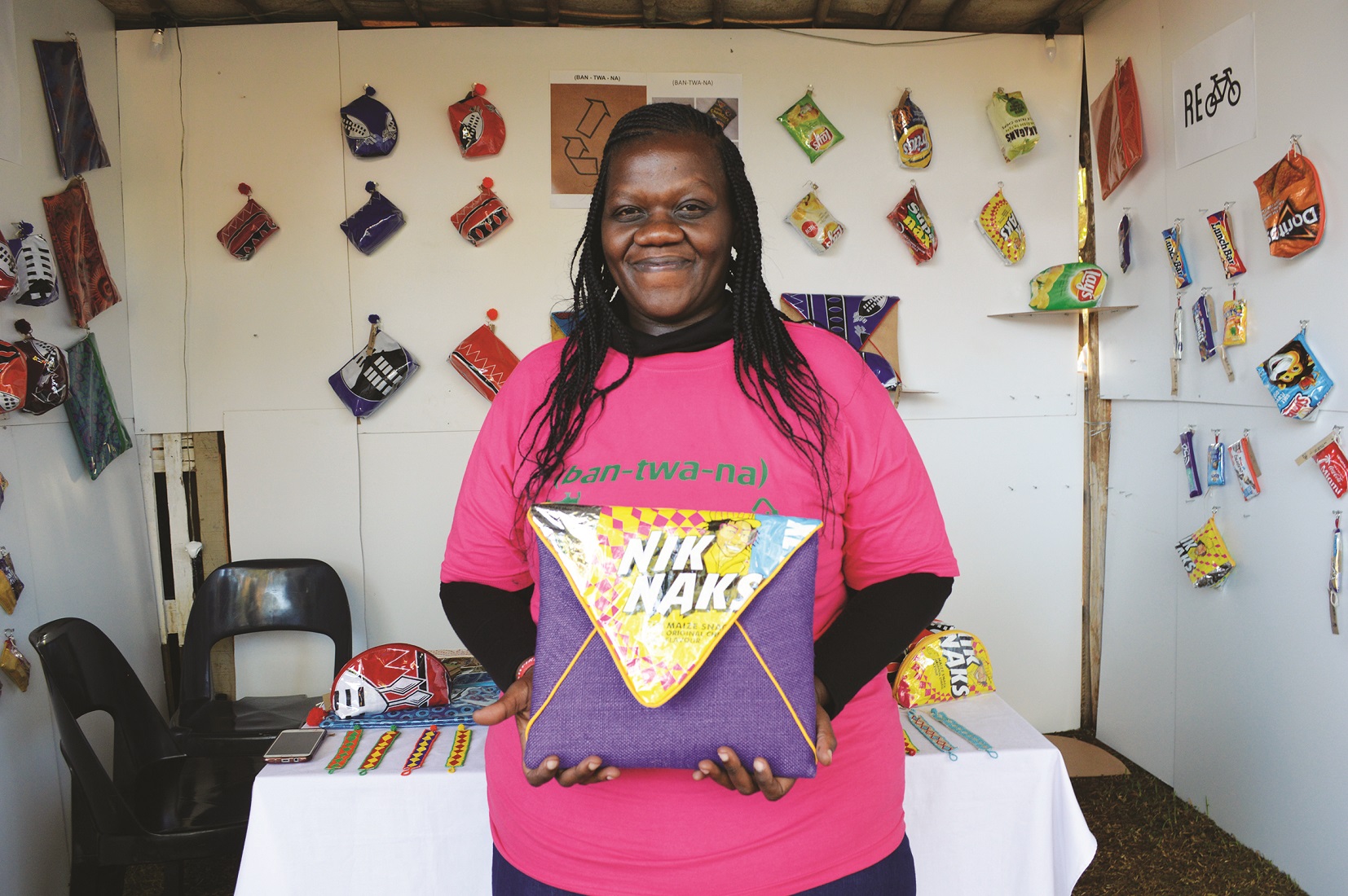In the mountainous kingdom of eSwatini, a former pre-school helper is turning trash to treasure.
On a sunny afternoon in May, Swaziland entrepreneur Lungile Beuta sets up her stall in the swaying sugarcane fields of Malkerns, a small sleepy town with a magnificent view of the mountains in the landlocked country now known as ‘the Kingdom of eSwatini’.
May is also when the annual bushfire festival brings together thousands of music-lovers from around the world to this little strip of land for a cultural fiesta. Beuta’s stall selling bric-a-brac is set up in a corner of the marketplace surrounded by other stalls.
A banner fronting her stall and created out of used paper packets says ‘ban-twa-na’ – the name of her business – meaning ‘children’ in siSwati. Around her are more empty packets and wrappers that contained chips, snacks and sweets. It’s a riot of plastic and color at first glance, but passers-by soon realize this isn’t just meaningless rubbish, but everything from purses to pencil cases to handbags made out of them.
“For me, there’s nothing more that brings joy than making these products,” says Beuta.
The 43-year-old grew up in Mbabane, the mountainous capital city of the kingdom.
After high school, she wanted to study design. Her parents sent her to Technikon Witwatersrand in Johannesburg, South Africa, where she pursued a diploma in fashion design.
In her last year at college, tragedy struck. A week before the 21-year-old Beuta’s graduation, she was asked to leave for Swaziland immediately. Her mother had gone missing. Her world came apart.
Even today, Beuta is hopeful she will one day find her mother.
“We tried to search and search and it didn’t help. We were told to look here and go there, but I still do have the hope that she is alive. That’s me. And people look at me like ‘ok, she should be in her 70s’ and I’m like, ‘is there anything wrong with that’?”
As Beuta gets emotional, passers-by stop by her stall, intrigued by her products. One customer asks for Beuta’s business card. She wants to make a bulk order of her bags for a wedding in South Africa.
“Thank you for giving us something worthy to buy,” the client says.
Her sorrow forgotten, Beuta’s face lights up. The over five years in this business has been worth it.
After her studies, she had been a self-employed designer, working from home. It didn’t work. In 2006, she secured a job as a helper in a pre-school in the town where she lived. Beuta loved children, would help them learn nursery rhymes and take them for nature-walks. She would also pick up the waste scattered in the streets a few meters from the school.
Beuta planned on giving the children farewell gifts for their end-of-year party. She then had the idea of creating beautiful objects out of the waste packets she picked up. With her sewing skills, she made them pencil cases out of used chips packets. The children loved them.
“Their parents were like ‘hmm, chips? Why are you giving my kids chips?’ And I had to tell them, ‘no it is actually a chip bag’,” she says.
“It was exciting and then the parents were like ‘ok, you know what? Why don’t you try and turn this into a business’.” The rest was history.
Beuta decided to join the Swaziland Fair Trade (SWIFT) to attain crucial skills selling handicraft and running a business.
Her husband worked with Beuta to get her business off the ground. They would collect the waste bags, she would sew them and he would manage the brand and finances.
She says the business has since grown by 75% and she plans to employ more people to help with the production and grow her business into a wholesale company.
In 2016, she participated in 100% Design South Africa, a large curated exhibition platform for sourcing high-end contemporary design in Africa. She stocks her products in stores and hotels around the country and has become a SWIFT board member.
“I use [the profits] to support my family. I am now able to save and not just [live] hand-to-mouth, which is important,” says the mother of two.
Besides the growth in the business, she is content she can also give back to the environment.
“…you’ve got the aspect of knowing what you are doing out there for the environment as well, because we have a major problem here in Swaziland, with plastic flying all over the place, and people burning plastic,” she says.
Beuta has also expanded to up-cycle cans, washing powder packets, newspapers, magazines, maize meal packaging and more into nifty key holders, coin purses, eye glass cases, wallets, sling bags, shopper bags.
This year, she has also introduced limited edition Afrocentric laptop bags, toiletry bags and backpacks.
In her search for more success, Beuta hopes that one day she will also find her missing mother, who she says has been her biggest inspiration.
Nothing is life is a wasted opportunity for this Swazi entrepreneur.
